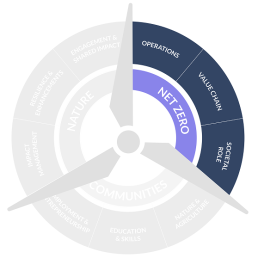What is the issue and why is it so important?
Greenhouse gas emissions (GHGs) are contributing to a climate crisis. Global temperatures have already risen by 1.1oC since pre-industrial times, and current trajectories suggest that this could rise to between 2.5oC and 4oC unless GHG emissions drop significantly.
This rise in global temperatures is already impacting societies and economies. This can be seen in more intense and unpredictable extreme weather like droughts, floods, storms and heatwaves. Similarly, areas such as human health, biodiversity, water security and food production are all significantly impacted by the warming world.
According to UN Secretary Antonio Guterres “we are teetering on a planetary tight rope”.
The time for global action is now.
Rezolv is committed to Net Zero business by 2050, and our ambition is underpinned by three focus areas

Operations
Though our operations represent a comparatively small proportion of our greenhouse gas emissions, they are also the area we have the greatest control over.
Value Chain
Our carbon footprint is primarily driven by our value chain. We will build a decarbonisation plan, particularly focused on our suppliers, that allows us to produce renewable energy as carbon efficiently as possible.
Societal Role
We see ourselves as key change makers in decarbonising the electricity mix of Central and Southeastern Europe. By generating clean, renewable energy we can support economies and societies to a green transition.
Role of renewables
Fossil fuels – including coal, oil, and natural gas – are the largest drivers of global climate change. They account for more than 75% of the world’s greenhouse gas emissions (GHGs) and nearly 90% of all carbon dioxide emissions. In contrast, renewable energy provides a cleaner, more sustainable alternative. Renewable energy comes from naturally replenished sources, including wind and solar, that are abundant and emit little to no greenhouse gases. Shifting toward renewable energy is essential for building a cleaner, safer, and more sustainable future for all.
Whilst the energy transition has accelerated in recent years, with clean technologies being deployed faster than ever and capital investment reaching record highs, global GHGs remain high. The energy sector is the largest emitter of all and plays a vital role in helping other industries reach their net zero targets. According to recent reports, the energy sector must be fully decarbonised by 2040 for other sectors to achieve their net-zero goals. This is a huge responsibility and emphasises the critical role that renewable energy providers such as Rezolv will play in the transition towards a net zero future.
Our approach
Enabled decarbonisation. Rezolv is proud to play a pivotal role in driving regional efforts to decarbonise the energy grid, which not only accelerates climate action but also enhances our competitive edge by meeting the rising demand for clean energy from global businesses. Guided by our mission to lead clean energy solutions in the just transition to net zero in Central and Southeastern Europe, we are actively reducing greenhouse gas emissions and moving the economy away from fossil fuels. Having already secured significant PPAs, we remain committed to partnering with stakeholders to accelerate their decarbonisation journeys and drive meaningful change.
Our own net zero ambition. As a key contributor to the net-zero transition, we are committed to addressing the GHG emissions generated by our operations. In 2024, we initiated a comprehensive analysis of our corporate and project-level carbon footprint, forecasting operational emissions across Scopes 1, 2, and 3. Building on these insights, we are developing a tailored low-carbon growth strategy. This approach includes supplier engagement, emissions reduction levers, and data-driven action plans to ensure measurable progress toward our net-zero goals by 2050.
Work to date and next steps
Though our operations represent a comparatively small proportion of our greenhouse gas emissions, they are also the area we have the greatest control over.
GHG footprint
We have developed a bottom-up GHG inventory for our office locations and the Vifor project, which began construction in 2024. We quantified Scope 1 and 2 emissions using activity-based data and conducted an SBTi-aligned Scope 3 emissions screening. While our current focus has been on our operations, we are also forecasting potential lifetime emissions for future projects, leveraging publicly available data.
Building out our climate strategy
In 2025, we aim to establish a tailored low-carbon growth strategy that aligns with science-based targets and industry best practices. This includes forecasting operational Scope 1, 2, and 3 emissions trajectories, assessing supplier engagement opportunities, and identifying sector-specific decarbonization levers for construction and operations. By integrating these insights, we will develop actionable plans to guide our near-term (3-5 years) and long-term emissions reduction efforts, ensuring progress toward our net-zero goal.
Scenario analysis
Rezolv, in partnership with Actis, undertook a comprehensive climate scenario analysis to assess the physical risks and opportunities across our portfolio. Using three IPCC scenarios, the analysis evaluated acute and chronic hazards such as extreme heat, drought, and water stress at asset level. The findings revealed that our portfolio overall demonstrates strong resilience to physical climate risks. This underscores our ability to navigate the challenges of a changing climate effectively. Looking ahead, we aim to deepen this work by integrating transition risks and exploring opportunities linked to the energy transition. These insights will guide our adaptation strategies and reinforce our commitment to sustainable and resilient operations.